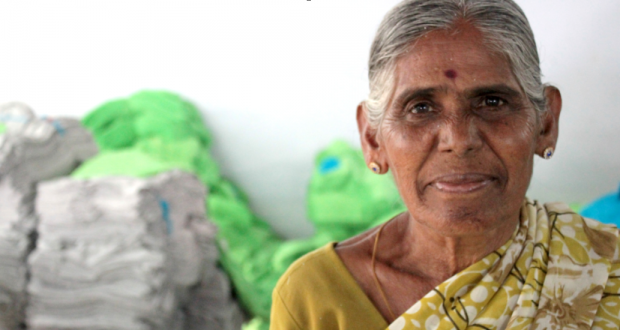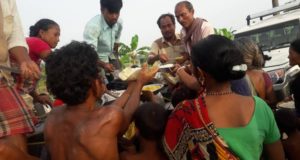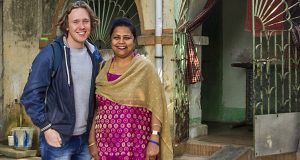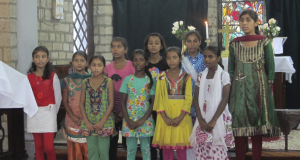Human trafficking is usually associated with the sex trade, but it forms a key part of the textile industry as well. On a recent Women of Strength trip to India, Bindy Taylor saw first-hand the working conditions experienced by the people who make our clothes.
The connection between clothing production and human trafficking is one of the world’s best-kept secrets. As a general rule of thumb, if you’re paying “not much” for a piece of clothing, it’s likely someone has been trafficked somewhere in the production process.
The Rana Plaza building collapse in Bangladesh on 24 April this year was a tragic incident that made the world stop, look and listen. The scenes splashed across our television screens, social media sites and smart phones presented horrific images of bodies amid rubble from the eight-storey building collapse—a collapse that claimed the lives of over 1000 people; young men and women who were taken far too soon.
The garment workers were well aware of the deathtrap they were entering on the day of the collapse, having witnessed large cracks in the building walls the day before. Warnings to avoid using the building were ignored by the factory supervisors and managers, who threatened staff with pay cuts and job loss if they chose not to enter. Some reluctant workers were beaten with sticks and herded into the building.
The incident at Rana Plaza exposed the ugly reality of cheap fashion to a largely unaware audience of global consumers. The underhand workings of many well-known fashion labels were exposed to a worldwide audience, and people wanted to know why these brands were shirking their responsibilities.
The lucrative Bangladesh textile industry injects A$20 billion into the economy each year; similarly, the textile industry in neighbouring India contributes A$62 billion annually.
A passage to India
India was the destination chosen for Women of Strength, a human trafficking prevention trip operated by Stop the Traffik and Amor Ministries. These organisations, dedicated to justice and mission, developed an inaugural eight-day program that would delve deep into the murky underground of the billion dollar textile industry. In August this year, a small contingent of women, including me, undertook this journey into India. What we experienced over the course of this trip had a powerful impact on all of us.
The program took our group into the region of Tamil Nadu, the manufacturing hub of India’s clothing and textile industry. Situated in the central south of India, this region comprises over 2000 textile spinning mills.
Young girls growing up in the Tamil Nadu region have few employment options and are commonly contracted by the mills for a period of one to five years. A “broker” organises the contract, and receives a royalty in addition to an ongoing commission for the term of the contract. The broker is an expert in wooing girls into factories, often showing pictures of resort-style factory scenarios that include swimming pools, gourmet meals and exciting activities.
The majority of girls are employed under contracts referred to as Sumangali schemes. Sumangali means “happily married woman” in Tamil—its name relates to the lump sum payment (usually between A$500–A$1000) made at the finalisation of the girl’s work contract. This payment is often used as a dowry. Dowries are prohibited under Indian civil law, but providing a dowry remains a common illegal practice.
In addition to the lump sum at the termination of their contracts, girls are sometimes paid a miniscule wage throughout the period of their employment. Once missed working hours have been tallied and expenses such as accommodation and food have been taken into account this wage usually equates to just A$5 a week.
Sign your life away
Upon visiting Tamil Nadu to hear stories from girls employed in Sumangali schemes, I began to understand why around 80 per cent never make it to the end of their contract.
The girls our group visited shared stories of physical and verbal abuse. During the course of their frequent 15 to 16 hour work days, six days a week, many were yelled at or struck by supervisors who wanted them to work harder and faster.
On an average day, the girls were not provided with protective equipment. When an audit was scheduled they would don a complete set of protective clothing—a mask, hat and apron. However, as soon as the auditor left, the clothing would have to be returned. One girl shared a story about a friend who repeatedly asked supervisors for medical help. When she was finally taken to a hospital, it was discovered that she had 2 kg of cotton in her stomach—she had inhaled this in the workplace.
Inadequate training also led to fatalities. One girl was scalped to death after the manager failed to inform her that the spinning loom would take half an hour to wind down once it was powered off.
In addition to the harsh conditions suffered during the work day, girls are also often abused outside their working hours. Pills are given to them, disguised as vitamins. The drugs stop the girls from menstruating, which factory managers think will make them more productive. The food served is bland—meals often consist of plain rice, and occasionally a dahl. The girls are not allowed to leave the confines of the factory property unless it is a special holiday. Many are denied any contact with the outside world, including family contact either by phone or face-to-face.
Ethical fashion
So, why hasn’t anyone stopped this? Why are major brands continuing to fuel modern day slavery through their negligence? There are several reasons. Most prominent is the ownership of the factories—they are entirely owned by Indian politicians. In addition to this, exposure of malpractice occurring within spinning mills can lead to closure, which is not usually very effective. Mills and factories that are shut down simply relocate to a neighbouring country, such as Bangladesh, and the trafficking process is repeated in that location. The closure also leaves the people of Tamil Nadu with few employment options, resulting in extreme poverty.
The spinning of yarn is only one part of the 14-stage clothing production process. It is difficult to pinpoint unethical behaviour in each stage of the process, and this poses a challenge for consumers wishing to purchase an entirely ethical piece of clothing. In an attempt to help consumers confronted by this problem, Baptist World Aid recently released the Ethical Fashion Guide, which details as closely as possible the ethical authenticity of a number of big brand retailers and clothing brands.
My experiences in taking part in the Women of Strength trip, and the stories I was privy to whilst in India, have altered my own behaviour and outlook in many ways.
My clothing purchasing habits have changed significantly as I strive to avoid unethical brands— or “human traffickers”, a term which now feels more appropriate. These are commonly brands or stores that continually offer low prices. If you dig a little deeper into the workings of these labels and organisations you will discover their disregard for human life, fuelled by greed and a determination to grow profits with wilful ignorance.
Christmas is an opportunity to think about purchasing gifts with an ethical mindset this year. As consumers, we can make a difference.
Bindy Taylor is the Communications Manager for Uniting Church South Australia.
In 2014, Stop the Traffik will launch a trafficking free cotton campaign. To find out more about Stop the Traffik or to donate, visit stopthetraffik.org/Australia
To learn more about global mission trips operated by Amor Ministries, visit amor.org
Baptist World Aid’s Ethical Fashion Guide is available online at baptistworldaid.org.au/behind-the-barcode
 JourneyOnline
JourneyOnline







